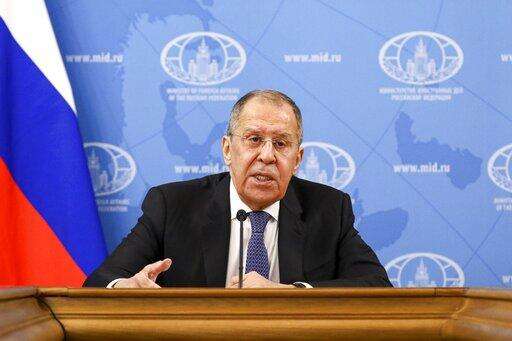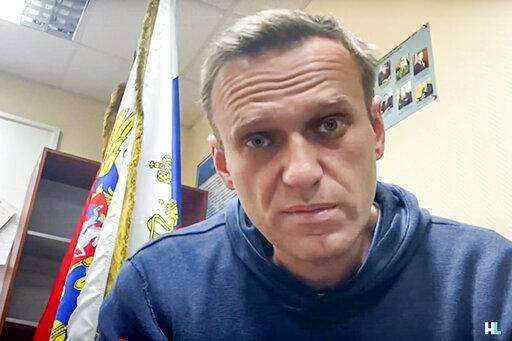Alexei Navalny and his wife Yuliastand in line at the passport control after arriving at Sheremetyevo airport, outside Moscow, Russia, Sunday, Jan. 17, 2021. Russia's prison service says opposition leader Alexei Navalny has been detained at a Moscow airport after returning from Germany. (AP Photo/Mstyslav Chernov)
The Associated Press
MOSCOW (AP) - A Russian judge on Monday ordered opposition leader Alexei Navalny jailed for 30 days, after the leading Kremlin critic returned to Russia from Germany where he was recovering from nerve agent poisoning that he blames on President Vladimir Putin's government.
The ruling followed a hastily set up court hearing at a police precinct where Navalny was being held since his arrest at a Moscow airport on Sunday evening, which sparked sharp reactions both at home and around the world.
A crowd of Navalny supporters outside the precinct shouted 'œShame!'ť as the judge announced the ruling and Navalny's allies immediately called for protests. His arrest had already prompted a wave of criticism from U.S. and European officials, adding to existing tensions between Russia and the West.
His top strategist, Leonid Volkov, announced preparations for 'œlarge rallies" on Saturday 'œall across the country."
'œDon't be afraid, take to the streets,'ť Navalny said in a video statement released after the ruling was announced. 'œDon't come out for me, come out for yourselves and your future.'ť
At least 13 protesters were detained Monday outside the police precinct where the court hearing was held, and at least 55 demonstrators were rounded up by police in St. Petersburg, Russia's second-largest city, according to activists.
The 44-year-old Navalny, Putin's most well-known critic, campaigned to challenge him in the 2018 presidential election but was barred from running. He has issued scores of damning reports over the years about corruption in Russia under Putin's regime. After recuperating for months in Berlin after his Aug. 20 poisoning, he returned to Russia on Sunday evening despite the warrant for his arrest.
As expected, Navalny was detained at passport control at Sheremetyevo Airport after the plane was diverted from landing at another Moscow airport in what was seen as an attempt to foil supporters who had gathered to cheer their hero's arrival.
Russia's prison service said Navalny had violated probation terms from a suspended sentence on a 2014 money-laundering conviction, which he says is contrived and politically motivated. The service said it would seek to have Navalny serve his 3ˆ½-year sentence behind bars.
Navalny described the move as an attempt by the Kremlin to deter him from coming back to Russia to continue his political activities.
A court hearing on the prison service's motion to have Navalny serve his suspended sentence in prison is scheduled for Feb. 2, according to his lawyers.
Amnesty International, which called Navalny a prisoner of conscience, denounced Monday's court hearing as a 'œmockery of justice.'ť
Calls for Navalny's immediate release have come from European Commission President Ursula von der Leyen, the office of the U.N. High Commissioner for Human Rights, British Foreign Secretary Dominic Raab and top officials of other EU nations.
German government spokesman Steffen Seibert noted that "the Russian authorities have arrested the victim of an attempted assassination with a chemical weapon, not the perpetrator'ť and called for Navalny's release.
U.S. President-elect Joe Biden's pick for national security adviser, Jake Sullivan, also called on Russian authorities to free Navalny, and the outgoing U.S. secretary of state, Mike Pompeo, said the U.S. 'œstrongly condemns'ť the decision to arrest the opposition leader.
Russian Foreign Minister Sergey Lavrov said Monday that the stream of Western reactions to Navalny's arrest reflected an attempt 'œto divert attention from the deep crisis of the liberal model of development."
'œNavalny's case has received a foreign policy dimension artificially and without any foundation,'ť Lavrov said, arguing that the detention was a prerogative of Russian law enforcement agencies. 'œIt's a matter of observing the law.'ť
Navalny spent the night at the police precinct outside Moscow. In a highly unusual development, the court hearing on Monday was held right at the precinct, and his lawyers said they were notified only minutes before.
'œIt is impossible, what is happening over here,'ť Navalny said in a video from the improvised courtroom that was posted on his page in the messaging app Telegram. 'œIt is lawlessness of the highest degree.'ť
The judge ordered that Navalny be remanded in custody until Feb. 15. Navalny's lawyers said they would appeal the ruling.
Navalny fell into a coma while aboard a domestic flight from Siberia to Moscow on Aug. 20. He was transferred from a hospital in Siberia to a Berlin hospital two days later. Labs in Germany, France and Sweden, and tests by the Organization for the Prohibition of Chemical Weapons, established that he was exposed to a Soviet-era Novichok nerve agent.
Russian authorities, however, insisted that the doctors who treated Navalny in Siberia before he was airlifted to Germany found no traces of poison. Russia refused to open a full-fledged criminal inquiry, citing a lack of evidence that Navalny was poisoned, and Russian officials have challenged Germany to provide proof of the poisoning.
Last month, Navalny released the recording of a phone call he said he made to a man he alleged was a member of a group of officers of Russia's Federal Security Service, or FSB, who purportedly poisoned him in August and then tried to cover it up. The FSB has dismissed the recording as fake.
Navalny has been a thorn in the Kremlin's side for a decade, unusually durable in an opposition movement often demoralized by repression. Russian authorities have launched multiple criminal investigations against him, and he has been tried and convicted in two separate criminal cases widely seen as politically motivated.
In December 2014, Navalny was convicted on charges of fraud and money-laundering and received a 3ˆ½-year suspended sentence, which he denounced as politically motivated and which the European Court of Human Rights found 'œarbitrary and manifestly unreasonable.'ť
The sentence carried a probation period that was to expire in December 2020. Authorities said that Navalny was subject to regular in-person checks with law enforcement officers as a condition of his probation. In December, days before his probation period was supposed to end, Russia's prison service accused Navalny of not appearing for these checks, including when he was convalescing in Germany.
As he boarded a plane bound for Moscow on Sunday, he brushed off concerns about being detained again in Russia, saying: 'œIt's impossible. I'm an innocent man.'ť
___
Vladimir Isachenkov in Moscow, Geir Moulson and Frank Jordans in Berlin contributed to this report.
In this image taken from video released by Kira Yarmysh on her Twitter account, Russian opposition leader Alexei Navalny gestures as he waits for a court hearing in a police station in Khimki, outside in Moscow, Russia, Monday, Jan. 18, 2021. Russian opposition leader Alexei Navalny's arrest as he arrived in Moscow after recovering from his poisoning with a nerve agent has drawn widespread criticism from Western nations. (@Kira_Yarmysh via AP)
The Associated Press
Police officers stand at an entrance of the court building during Navalny's court hearing in Khimki, outside in Moscow, Russia, Monday, Jan. 18, 2021. Russian opposition leader Alexei Navalny's arrest as he arrived in Moscow after recovering from his poisoning with a nerve agent drew criticism from Western nations and calls for his release. (AP Photo/Pavel Golovkin)
The Associated Press

In this handout photo released by Russian Foreign Ministry Press Service, Russian Foreign Minister Sergey Lavrov speaks during his annual news conference in Moscow, Russia, Monday, Jan. 18, 2021. Lavrov said Monday the stream of reactions to Navalny's arrest by Western officials reflects an attempt "to divert attention from the crisis of the Western model of development." "Navalny's case has received a foreign policy dimension artificially and without any foundation," Lavrov said, arguing that his detention was a prerogative of Russian law enforcement agencies that explained their action. (Russian Foreign Ministry Press Service via AP)
The Associated Press

Alexei Navalny and his wife Yulia sit on the plane on a flight to Moscow, at the Airport Berlin Brandenburg (BER) in Schoenefeld, near Berlin, Germany, Sunday, Jan. 17, 2021. Leading Kremlin critic Alexei Navalny flew home to Russia on Sunday after recovering in Germany from his poisoning in August with a nerve agent. (AP Photo/Mstyslav Chernov)
The Associated Press
In this grab taken from video, Alexei Navalny and his wife Yulia stand at the passport control before Navalny was detained by police after arriving at Sheremetyevo airport, outside Moscow, Russia, Sunday, Jan. 17, 2021. Russia's prison service says opposition leader Alexei Navalny has been detained at a Moscow airport after returning from Germany. (AP)
The Associated Press
Alexei Navalny and his wife Yuliastand in line at the passport control after arriving at Sheremetyevo airport, outside Moscow, Russia, Sunday, Jan. 17, 2021. Russia's prison service says opposition leader Alexei Navalny has been detained at a Moscow airport after returning from Germany. (AP Photo/Mstyslav Chernov)
The Associated Press
In this photo taken from video, Alexei Navalny kisses his wife Yulia as he is detained by police at the passport control after arriving at Sheremetyevo airport, outside Moscow, Russia, Sunday, Jan. 17, 2021. Russia's prison service says opposition leader Alexei Navalny has been detained at a Moscow airport after returning from Germany. (AP)
The Associated Press
Police officers stand at an entrance of the police station during Navalny's court hearing in Khimki, outside in Moscow, Russia, Monday, Jan. 18, 2021. Russian opposition leader Alexei Navalny's arrest as he arrived in Moscow after recovering from his poisoning with a nerve agent drew criticism from Western nations and calls for his release. (AP Photo/Pavel Golovkin)
The Associated Press
In this image taken from video released by Navalny Life youtube channel, Russian opposition leader Alexei Navalny speaks as he waits for a court hearing in a police station in Khimki, outside in Moscow, Russia, Monday, Jan. 18, 2021. A judge has ordered to remand Russian opposition leader Alexei Navalny in custody for 30 days, his spokeswoman Kira Yarmysh said on Twitter. The ruling Monday concluded an hours-long court hearing set up at a police precinct where the politician has been held since his arrest at a Moscow airport Sunday. (Navalny Life youtube channel via AP)
The Associated Press

In this image taken from video released by Navalny Life youtube channel, Russian opposition leader Alexei Navalny speaks as he waits for a court hearing in a police station in Khimki, outside in Moscow, Russia, Monday, Jan. 18, 2021. A judge has ordered to remand Russian opposition leader Alexei Navalny in custody for 30 days, his spokeswoman Kira Yarmysh said on Twitter. The ruling Monday concluded an hours-long court hearing set up at a police precinct where the politician has been held since his arrest at a Moscow airport Sunday. (Navalny Life youtube channel via AP)
The Associated Press
Police officers stand at an entrance of the police station during Navalny's court hearing in Khimki, outside in Moscow, Russia, Monday, Jan. 18, 2021. Russian opposition leader Alexei Navalny's arrest as he arrived in Moscow after recovering from his poisoning with a nerve agent drew criticism from Western nations and calls for his release. (AP Photo/Mstyslav Chernov)
The Associated Press
Police officers stand at an entrance of the police station during Navalny's court hearing in Khimki, outside in Moscow, Russia, Monday, Jan. 18, 2021. Russian opposition leader Alexei Navalny's arrest as he arrived in Moscow after recovering from his poisoning with a nerve agent drew criticism from Western nations and calls for his release. (AP Photo/Mstyslav Chernov)
The Associated Press
A supporter of Russian opposition leader Alexei Navalny holds his portrait on a poster reading "For Navalny", at the police station during his court hearing in Khimki, outside in Moscow, Russia, Monday, Jan. 18, 2021. Russian opposition leader Alexei Navalny's arrest as he arrived in Moscow after recovering from his poisoning with a nerve agent drew criticism from Western nations and calls for his release. (AP Photo/Pavel Golovkin)
The Associated Press
Supporters of Russian opposition leader Alexei Navalny, one of them holding his portrait on a poster reading "For Navalny", at the police station during his court hearing in Khimki, outside in Moscow, Russia, Monday, Jan. 18, 2021. Russian opposition leader Alexei Navalny's arrest as he arrived in Moscow after recovering from his poisoning with a nerve agent drew criticism from Western nations and calls for his release. (AP Photo/Pavel Golovkin)
The Associated Press
In this image taken from video released by @Kira_Yarmysh, Russian opposition leader Alexei Navalny gestures as he waits for a court hearing in a police station in Khimki, outside in Moscow, Russia, Monday, Jan. 18, 2021. Russian opposition leader Alexei Navalny's arrest as he arrived in Moscow after recovering from his poisoning with a nerve agent has drawn widespread criticism from Western nations. (@Kira_Yarmysh via AP)
The Associated Press
In this image taken from video released by @Kira_Yarmysh, Russian opposition leader Alexei Navalny gestures as he waits for a court hearing in a police station in Khimki, outside in Moscow, Russia, Monday, Jan. 18, 2021. Russian opposition leader Alexei Navalny's arrest as he arrived in Moscow after recovering from his poisoning with a nerve agent has drawn widespread criticism from Western nations. (@Kira_Yarmysh via AP)
The Associated Press